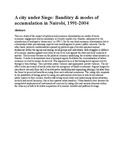| dc.contributor.author | Katumanga, Musambayi | |
| dc.date.accessioned | 2013-06-29T11:35:12Z | |
| dc.date.available | 2013-06-29T11:35:12Z | |
| dc.date.issued | 2005 | |
| dc.identifier.citation | Review of African Political Economy Volume 32, Issue 106, 2005 | en |
| dc.identifier.uri | http://www.tandfonline.com/doi/abs/10.1080/03056240500466981#.Uc7GGfLG2_I | |
| dc.identifier.uri | http://erepository.uonbi.ac.ke:8080/xmlui/handle/123456789/42420 | |
| dc.description.abstract | This is a study of the impact of political and economic liberalisation on modes of socio-economic engagement and accumulation in Kenya's capital city, Nairobi, subsequent to the introduction of multiparty ‘democracy’ in 1992.1
On the one hand economic liberalisation led to a diminished state-provisioning capacity and unwillingness to protect public interests. On the other hand, political conditionalities opened up political space but also spawned anomic tendencies within the regime and among social groups and individuals, with struggles in defence of economic position against each other at one level, and against the state and local councils at another. This account focuses on the political economy underlying the resultant urban banditry in Nairobi. It seeks to demonstrate how a besieged regime facilitates the criminalisation of urban existence in a bid to ensure its survival.
The argument here is that beleaguered regimes survive through a twin strategy. They privatise public violence and appropriate private violence. The net effect is the perversion of social order and the emergence of bandit economies. Regime longevity may derive not only from lack of an alternative leadership and organising ideology, but also from the threat to perceived benefits accruing from such informal economies. The ruling elite responds to the possibility of losing power by using neo-patrimonial structures to selectively allocate public spaces to their cronies, thereby subverting social order and undermining democratisation, security and social harmony; this in turn spawns urban banditry. Urban banditry here denotes the unregulated deployment of instruments of coercion by ruling elite and various elements within the citizenry in bids to facilitate acquisition of economic benefits and political leverage | en |
| dc.language.iso | en | en |
| dc.publisher | Taylor and Francis | en |
| dc.title | A city under Siege: Banditry & modes of accumulation in Nairobi, 1991-2004 | en |
| dc.type | Article | en |
| local.publisher | Department of Political Science, University of Nairobi | en |

